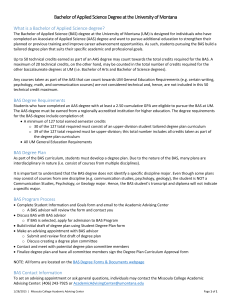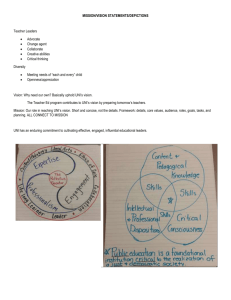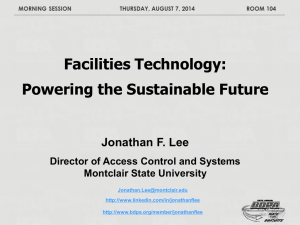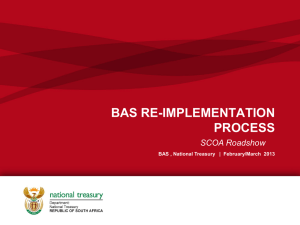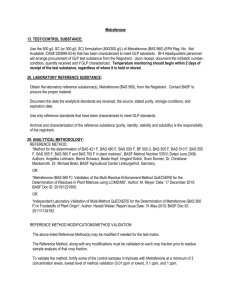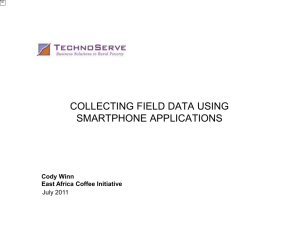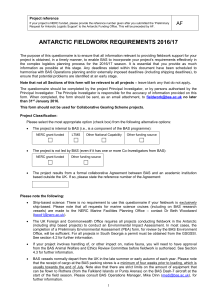bas_task_force_report - University of Northern Iowa
advertisement
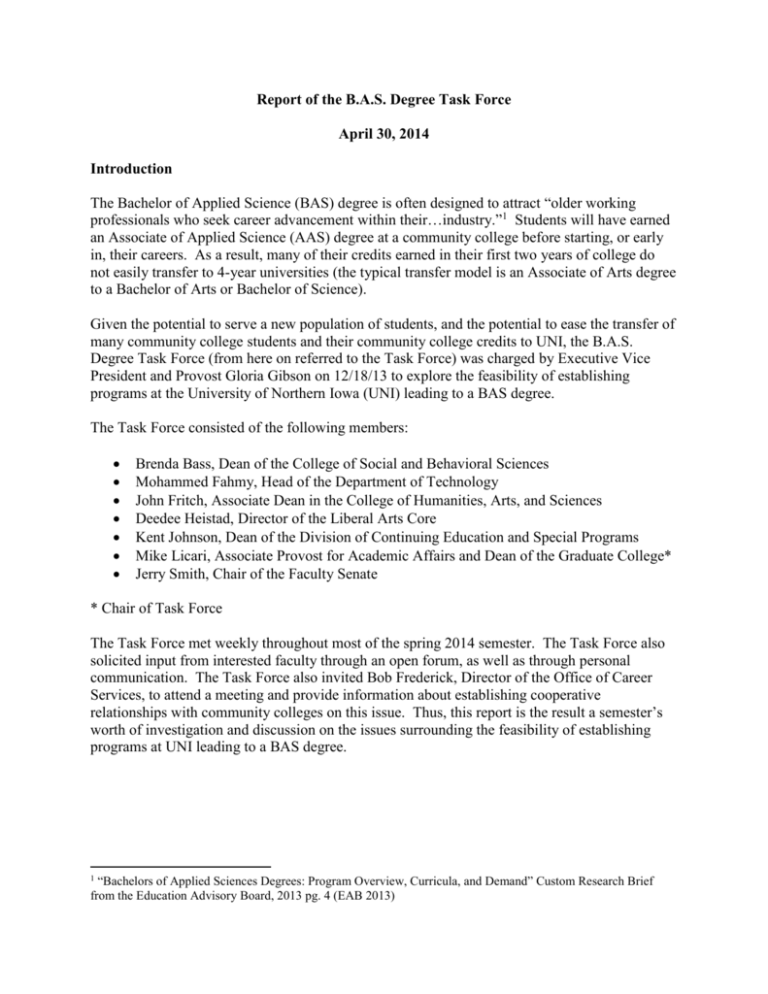
Report of the B.A.S. Degree Task Force April 30, 2014 Introduction The Bachelor of Applied Science (BAS) degree is often designed to attract “older working professionals who seek career advancement within their…industry.”1 Students will have earned an Associate of Applied Science (AAS) degree at a community college before starting, or early in, their careers. As a result, many of their credits earned in their first two years of college do not easily transfer to 4-year universities (the typical transfer model is an Associate of Arts degree to a Bachelor of Arts or Bachelor of Science). Given the potential to serve a new population of students, and the potential to ease the transfer of many community college students and their community college credits to UNI, the B.A.S. Degree Task Force (from here on referred to the Task Force) was charged by Executive Vice President and Provost Gloria Gibson on 12/18/13 to explore the feasibility of establishing programs at the University of Northern Iowa (UNI) leading to a BAS degree. The Task Force consisted of the following members: Brenda Bass, Dean of the College of Social and Behavioral Sciences Mohammed Fahmy, Head of the Department of Technology John Fritch, Associate Dean in the College of Humanities, Arts, and Sciences Deedee Heistad, Director of the Liberal Arts Core Kent Johnson, Dean of the Division of Continuing Education and Special Programs Mike Licari, Associate Provost for Academic Affairs and Dean of the Graduate College* Jerry Smith, Chair of the Faculty Senate * Chair of Task Force The Task Force met weekly throughout most of the spring 2014 semester. The Task Force also solicited input from interested faculty through an open forum, as well as through personal communication. The Task Force also invited Bob Frederick, Director of the Office of Career Services, to attend a meeting and provide information about establishing cooperative relationships with community colleges on this issue. Thus, this report is the result a semester’s worth of investigation and discussion on the issues surrounding the feasibility of establishing programs at UNI leading to a BAS degree. “Bachelors of Applied Sciences Degrees: Program Overview, Curricula, and Demand” Custom Research Brief from the Education Advisory Board, 2013 pg. 4 (EAB 2013) 1 Findings The Task Force finds that it is feasible to establish a number of programs at UNI that would lead to a BAS degree. The Task Force did identify a number of considerations and challenges that will need to be addressed in order to successfully establish those BAS programs. Considerations and Challenges The Task Force identified a number of issues that need to be addressed by campus in order for UNI to successfully launch BAS programs. None of these are insurmountable. In no particular order: Liberal Arts Core (LAC) A number of different alternatives are available to address the challenge of mapping students’ AAS degrees onto the LAC at UNI. These might include: a transfer of a block of credits which would meet a variety of category requirements; articulation on a case-by-case basis, varying by student and by community college curriculum; counting professional courses as equivalent to LAC courses; establishing a different LAC for BAS students; or waiving (via demonstration of competency) certain requirements given professional experience. Likely Program Areas Interest at UNI was expressed by the Computer Science department, the Department of Technology, some Criminology faculty, the Social Work department, some in the College of Business Administration, and the School of Applied Human Sciences. Not all of these units may develop BAS programs, and programs may be developed by others not listed. Curriculum Development As BAS programs at UNI are developed, the nature of the AAS curricula at the various community colleges will need to be considered in order to ensure our programs add value beyond the AAS. Our BAS programs will need to be a blend of liberal arts courses as well as courses that add professional expertise. The Task Force recommends some funding be available for faculty to visit universities with successful BAS programs. Admission Criteria As a result, it is important to consider eligibility for admission to a BAS program. If our programs are to be closely articulated with particular AAS programs, and if certain experiences within the AAS programs will map into our LAC, then these considerations may require carefully-constructed admissions criteria. Alignment of fields of study and professional experience will be important. In other words, graduates of certain AAS programs may not be eligible for admission into all BAS programs. Accreditations Certain program and college accreditations held by UNI may influence the ability to establish BAS programs. The most obvious issue is the AACSB accreditation held by the College of Business Administration. Other universities, with AACSB-accredited business schools, have successfully established management-oriented BAS programs, but they reside outside the colleges of business.2 2 EAB 2013 pg. 4 Delivery Methods The Task Force recognizes the fact that BAS programs at UNI are likely to be delivered online. This method has the benefit of reaching place-bound students, which is important given the target audience mentioned in the introduction. Further, the community around UNI is not especially large and viable BAS programs will likely need to draw students from further away. There may be some BAS programs that are able to attract sufficient demand via face-to-face delivery3, so the Task Force will not make a firm recommendation. Marketing and Enrollment Promoting BAS programs will require reaching different audiences than reached by typical undergraduate recruiting. Students who enroll in BAS programs are generally in their 30s who hold low to mid-level positions in their field, and who are looking for opportunities to advance into leadership roles.4 As a result, more targeted messaging will be needed. Coordination with community colleges will help as well. Bob Frederick, in his discussion with the Task Force, is convinced that community colleges will help promote BAS programs at UNI. For programs offered at a distance, the Division of Continuing Education and Special Programs can assist in marketing. Administrative Flexibility When developing BAS programs, UNI should consider opportunities to shift our administrative processes so that they fit the needs of the targeted students. This may include, for example, a shift away from semester-based offerings which could shorten the number of months required to complete the degree. The Master of Business Administration at UNI is already offered at a pace of three “modules” per year, rather than two semesters, so there is some precedent on campus. Other processes, such as orientation for transfer students, will have to be modified to fit the particular audience. Foreign Language Requirement The foreign language graduation requirement could be a barrier to attracting students. The new program in Technology Management leaves the issue openended, simply indicating that if the requirement has not been completed prior to joining the program, the student should consult with a UNI advisor. Some global solution is needed in order for a set of BAS programs to be successful. Higher Learning Commission (HLC) Should there be interest among the faculty in developing BAS programs, UNI will need to seek permission to offer the degree from the HLC. Conclusion The Task Force finds that BAS programs would fit the mission of the university very well. Although there are a number of issues to be addressed, the Task Force feels that none of them are insurmountable. Given these assessments, the Task Force encourages the university community to develop programs leading to a BAS degree. Indeed, UNI has just launched a program (Bachelor of Arts in Technology Management) that is essentially a BAS degree program, so we have a model to follow. 3 4 EAB 2013 pg. 5 EAB 2013 pg. 4

